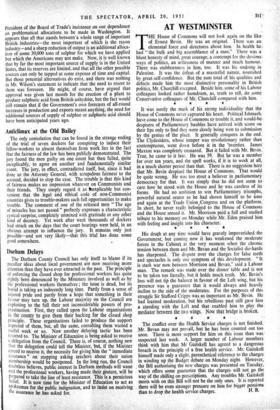AT WESTMINSTER
THE House of Commons will not look again on the like of Ernest Bevin. He was an original. There was an elemental force and directness about him. In health he had " the bulk and big assemblance of a man." There was a blunt honesty of mind, great courage, a contempt for the devious ways of politics, an artlessness of manner and much humour. There was stubbornness in him, too. It was his undoing in Palestine. It was the defeat of a masterful nature, nourished by great ,self-confidence. But the sum total of his qualities and defects made him the most distinctive personality in British politics, Mr. Churchill excepted. Beside him, some of his Labour colleagues looked rather humdrum, as, truth to tell, do some Conservative colleagues of Mr. Churchill compared with hint. * * * * .
It was surely the mark of his strong individuality that the House of Commons never captured his heart. Political lshmaels have come to the House of Commons to trouble it, and would-be, despisers of Parliamentary baubles have arrived with scorn on their lips only to find they were slowly being won to submission by the genius of the place. It generally conquers in the end. The Clydesiders, whose temper was revolutionary rather than contemptuous, went down before it in the 'twenties. James Maxton was completely ensnared. But it failed with Mr. Bevin. True, he came to it late. He was 59. But he was a member for over ten years, and the spell works, if it is to work at all, in a much shorter period than that. There is no suggestion here that Mr. Bevin despised the House of Commons. That would be quite wrong. He was too stout a believer in parliamentary democracy for that. It was simply that he did not seem to care how he stood with the House and he was careless of its forms. He had no ambition to win Parliamentary triumphs, powerful natural orator as he had shown himself to be time and again at the Trade Union/Congress and on the platform. In short, he never really belonged to the House of Commons and the House sensed it. Mr. Morrison paid a full and studied tribute to his memory on Monday while Mr. Eden praised him with feeling and insight into his character.
* * * * His death at any time would have gravely impoverished the Government, but coming now it has weakened the moderate forces in the Cabinet, at the very moment when the chronic tension between them and Mr. Bevan and the Socialist die-hards has sharpened. The dispute over the charges for false teeth and spectacles is only one symptom of this development. " It is stark war now between Morrison and Bevan," said a Labour man. The remark was made over the dinner table and is not to be taken too literally, but it holds much truth. Mr. Bevin's loss will not tip the balance in favour of the Left wing, but his presence was a guarantee that it would always and heavily incline to the side of the moderates. For the purposes of this struggle Sir Stafford Cripps was as important as Mr. Bevin. He had learned moderation, but his rebellious past still gave hint a standing with the Left and that enabled him to play the mediator between the two wings. Now that bridge is broken.
* * *- * The conflict over the Health Service charges is not finished. Mr. Bevan may not prevail, but he has been counted out too soon. There is more support for him on this issue than was suspected last week. A larger number of Labour members think with him that Mr Gaitskell has agreed to a dangerous breach in the principle of a free health service. Mr. Gaitskell himself made only a slight, parenthetical reference to the charges in winding up the Budget debate on Monday night. However, . the Bill authorising the new charges was presented on Tuesday, which offers some guarantee that the charges will not go the way of the shilling on prescriptions. Any troubles Mr. Gaitskell meets with on this Bill will not be the only ones. It is reported there will be even stronger pressure on him for bigger pensions than to drop the health service charges. H. B.


































 Previous page
Previous page